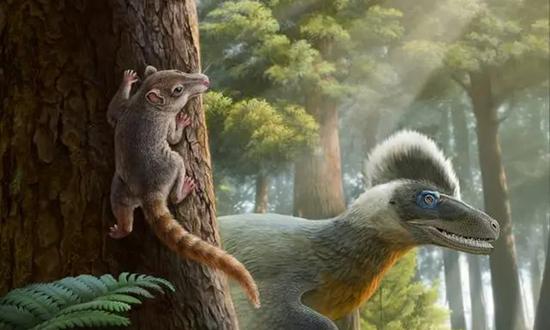Chinese scientists unveil middle ear evolution in 120 mln-year-old eutherian mammals

A reconstructed image of the newly identified eutherian mammal (left) (Photo/Courtesy of Chinese Academy of Sciences)
Scientists from the Chinese Academy of Sciences (CAS) have identified a new eutherian mammal, which marks the first time that Chinese scientists have revealed the middle ear structure of a eutherian mammal from 120 million years ago, filling a gap in research on middle ear evolution in the early Cretaceous era, according to a recent report by Science and Technology Daily.
The findings of the study have been published in the renowned journal Nature Communications.
The mammalian middle ear has long been considered a classic case of gradual evolution. Previous studies indicated that the transition from the lower jaw to the middle ear occurred in two evolutionary stages, ultimately separating the middle ear bones from the lower jaw.
"Despite this evolutionary event occurring multiple times in different lineages of Mesozoic mammals, direct evidence of middle ear evolution in mammalian ancestors closely related to humans has been limited," explained Wang Haibing, first author of the paper and a researcher at the Institute of Vertebrate Paleontology and Paleoanthropology of CAS.
Several years ago, a team led by researcher Wang Yuanqing from the same institute discovered a Cretaceous mammal fossil in the Jiufotang Formation in the Yixian Basin, Northeast China's Liaoning Province, dating back approximately 120 million years.
After restoration, the researchers employed high-precision CT scanning and 3D reconstruction techniques to delve into the fossil. They identified it as a new species of early Cretaceous eutherian mammal and named it Microtherulum oneirodes.
"The generic name Micro refers to the microtype configuration of the middle ear; therulum, little beast. The specific name from oneirodes (Greek), dreamlike, refers to the dreamlike fossil discovery that fills the gap in the middle ear evolution in early therians," according to the paper.
"The dreamlike aspect of this creature lies in its display of typical features of the modern mammalian middle ear as one of the earliest eutherian mammals, filling a gap in the early evolution of mammalian middle ears," said Wang.
"Compared to discovering new species with bizarre and unimaginable appearances, this long-awaited and anticipated fossil discovery adds an extra layer of excitement and joy to our research," he added.
The research team reconstructed the skull morphology of the creature and reported, for the first time, the skeletal morphology of the middle ear bones in early Cretaceous eutherian mammals.
"The Meckelian groove in the lower jaw of the creature has completely degenerated, indicating that the middle ear ossicles have completely detached from the lower jaw, exhibiting the characteristic features of the typical mammalian middle ear," Wang said.
According to Wang, this result differs from the Cokotherium jiufotangensis, a new eutherian species also discovered from the Jiufotang Formation which still retained a more delicate ossified Meckelian groove. This suggests that, even in closely related species in the early stages of mammalian evolution, there is a certain degree of variation in middle ear morphology.
In addition, the research team, integrating the latest phylogenetic framework, discussed the evolutionary trends of early mammalian auditory and feeding organs and then proposed that the divergence in the evolution of mammalian auditory and feeding organs occurred independently.
The evolutionary innovations in the auditory organs (middle ear, inner ear) of early Cretaceous eutherian mammals and the refinement of the tribosphenic structure laid a crucial foundation for the enhanced hearing ability and expanded ecological space of modern mammals, according to the report.
